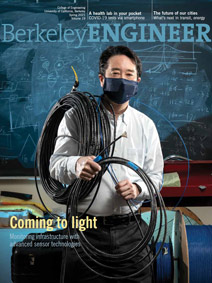 Gloria Tumushabe: “The more of us women in this space, the better.” (Photo by Adam Lau)
Gloria Tumushabe: “The more of us women in this space, the better.” (Photo by Adam Lau)Cultivating female coders in Africa

When Gloria Tumushabe (B.S.’20, M.S.’21 EECS) returned to her native Uganda in 2017 after her freshman year at Berkeley, she was disheartened — but not surprised — to see the great disparity between the number of male and female computer programmers. “In my country, there’s still a big stigma around girls being as smart as boys in science,” she said. “Very few homes have computers or WiFi. And if money is tight, it’s the boy who’ll be sent to college.”
That inequity stuck with her until last year, when COVID-19 hit and the Mastercard Foundation Scholar found herself sheltering in place. As the world quickly shifted to working remotely, Tumushabe decided to teach coding to Ugandan girls from her home in Walnut Creek, in a program she called Afro Fem Coders.
Remote learning is uncommon in Uganda, so many girls had to put their educations on hold during the shutdown. Tumushabe reached out by word-of-mouth and social media, and within two weeks she’d heard from more than 40 girls who had completed high school and were eager to join the semi-weekly classes. Unfortunately, only 13 of them had access to computers, and the classes were held at night after work, when going to a cybercafé isn’t safe for women. So Tumushabe began sending money, often from her own pocket, to buy laptops and pay for internet service. She also formed a network of female professionals worldwide — largely from the networks Sista Circle: Black Women in Tech and Zawadi Africa — to mentor the girls one-on-one.
In the year since the program was founded, it has already spread to other African countries. In May, a new cohort will begin with 120 girls from Kenya, Tanzania, Namibia, Botswana and Ethiopia as well as Uganda. Every girl has her own mentor, and there is an international waiting list of potential mentors.
After receiving her master’s degree in electrical engineering and computer sciences this spring, Tumushabe has a job as a software engineer awaiting her in Silicon Valley. She hopes to acquire several years of hands-on experience in the industry and possibly pursue her Ph.D. before returning to Uganda to run Afro Fem Coders full time.
“The more of us women in this space, the better,” she said.
